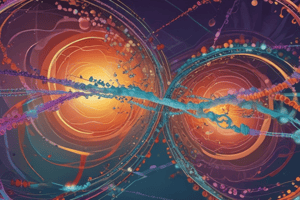Podcast
Questions and Answers
Which of the following is NOT a mechanism of eukaryotic gene regulation?
Which of the following is NOT a mechanism of eukaryotic gene regulation?
- Epigenetic modifications
- Transcription factor binding
- Operon regulation (correct)
- Post-translational modifications
What is the role of homeotic genes in development?
What is the role of homeotic genes in development?
- Regulating the production of specific proteins
- Determining the fate of individual cells
- Establishing the body's overall structure (correct)
- Controlling cell division rate
Which type of stem cell has the greatest potential to differentiate into various cell types?
Which type of stem cell has the greatest potential to differentiate into various cell types?
- Pluripotent
- Totipotent (correct)
- Multipotent
- Unipotent
How do viruses disrupt normal cellular processes?
How do viruses disrupt normal cellular processes?
Which of the following is NOT a potential application of biotechnology in gene regulation?
Which of the following is NOT a potential application of biotechnology in gene regulation?
Flashcards
Operon
Operon
A group of genes that are controlled by a single regulatory element and transcribed together as a single mRNA molecule.
Repressible operon
Repressible operon
A type of gene regulation where a repressor protein binds to the operator, blocking transcription of the operon.
Inducible operon
Inducible operon
A type of gene regulation where an inducer molecule binds to a repressor protein, preventing it from binding to the operator, allowing transcription of the operon.
Epigenetics
Epigenetics
Signup and view all the flashcards
Homeotic genes
Homeotic genes
Signup and view all the flashcards
Study Notes
Prokaryotic Gene Regulation
- Operon model used for gene regulation
- Repressible operons (e.g., trp operon): Turned "off" by corepressors
- Inducible operons (e.g., lac operon): Turned "on" by inducers
Eukaryotic Gene Regulation
- Multiple levels of regulation
- Epigenetics: DNA methylation suppresses genes, histone acetylation activates them
- Transcription factors: Control gene activation
- Post-transcriptional regulation: RNA splicing and stability control expression
- Translational and post-translational regulation: Protein synthesis and modification control function
Development
- Cytoplasmic determinants and induction guide cell differentiation
- Homeotic genes control body pattern formation
Stem Cells
- Totipotent stem cells: Form all cell types
- Pluripotent stem cells: Form most cell types
- Essential for regenerative medicine
Cancer
- Mutations in oncogenes (promote cell growth) or tumor suppressor genes (inhibit growth) lead to uncontrolled cell division
Viruses
- Viruses hijack host gene regulation, potentially integrating into genomes and disrupting normal processes
Biotechnology
- CRISPR used for precise DNA editing
- Recombinant DNA and gene therapy used for research and treatment
Studying That Suits You
Use AI to generate personalized quizzes and flashcards to suit your learning preferences.





